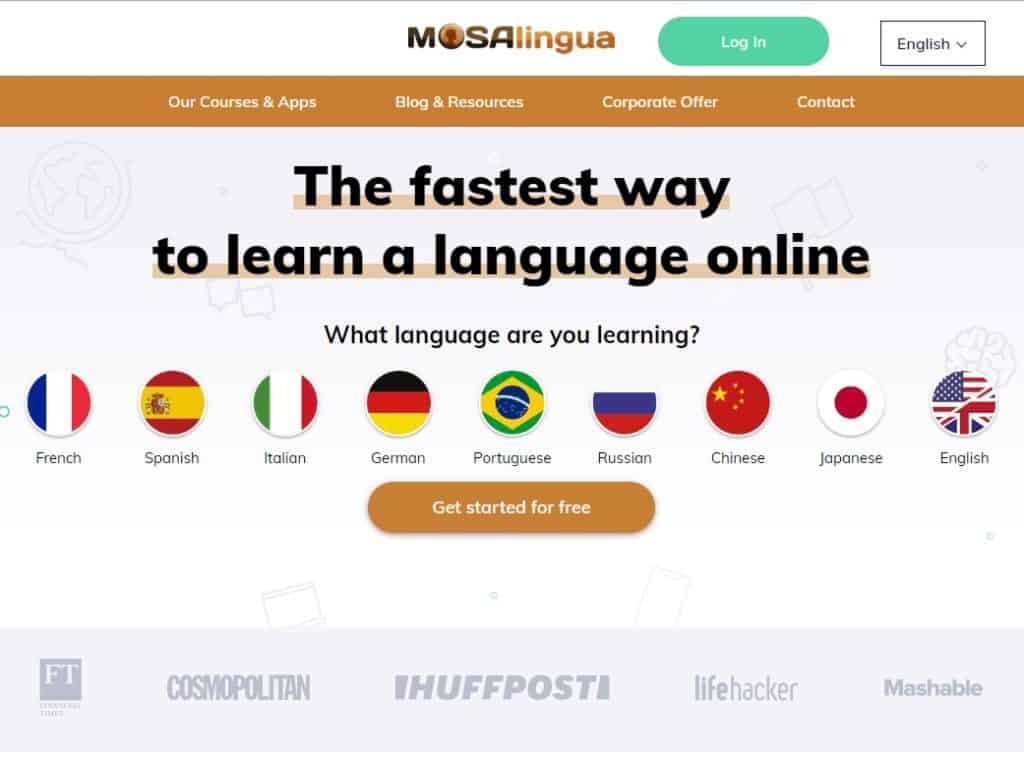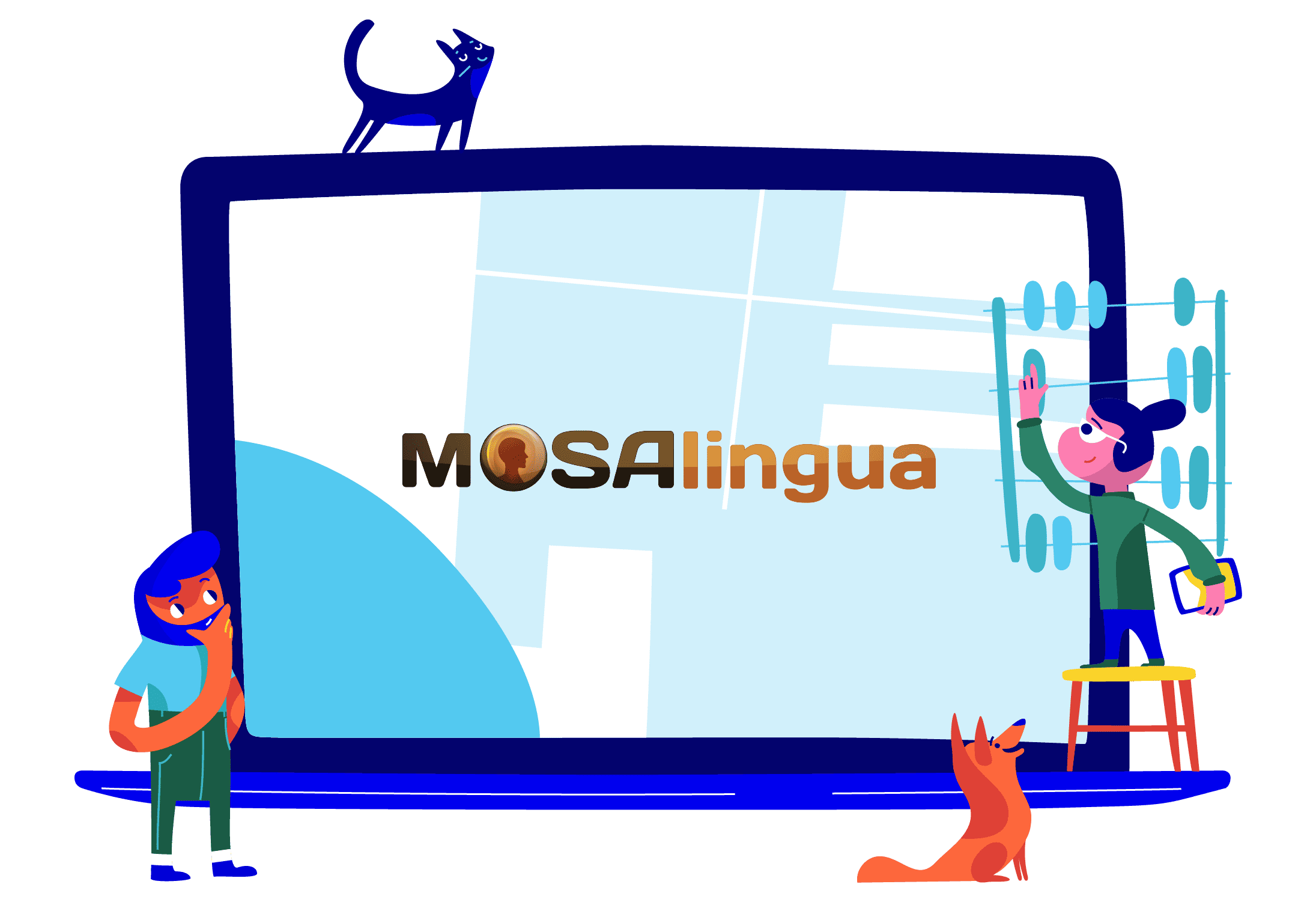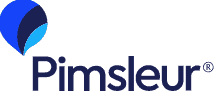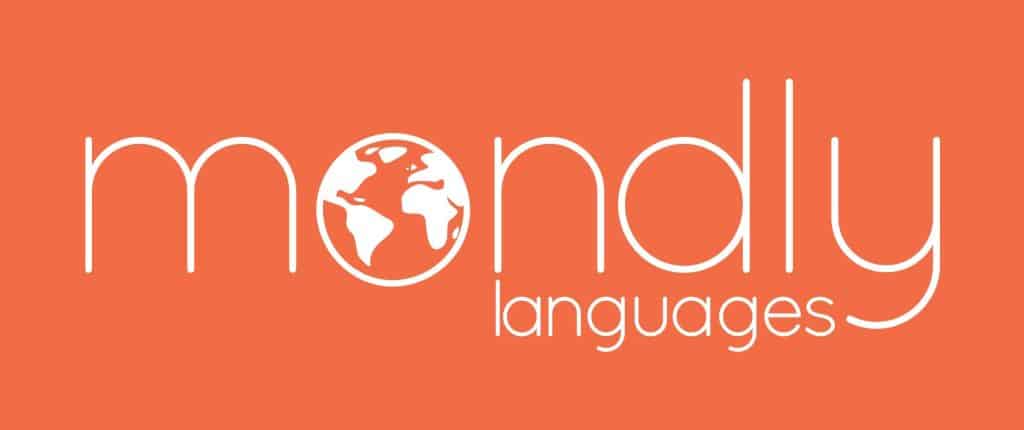Flashcard apps are an excellent resource for language learners struggling to find time to learn languages. They promote active recall, but this language learning method often feels repetitive and mostly focuses on teaching new words and phrases.
Among such language apps, MosaLingua is a popular choice for covering the essentials in your target language. It covers complex grammar rules and provides additional materials to improve other language skills. For those that like flashcard apps but find focusing only on vocabulary ineffective, MosaLingua might be the right fit.
In this article, we’ll cover everything about MosaLingua. Read till the end to determine if its flashcards and teaching method align with your language learning goals.
8.3
TOTAL SCORE
An effective flashcard app that teaches common vocabulary

MosaLingua teaches the most common vocabulary with its 20/80 approach. It does this with a customizable flashcard deck covering new vocabulary, detailed grammar rules, culture, and useful tips. The app brings these together with a self-evaluation feature that makes it highly effective for picking up a new language.
MosaLingua Review Summary
| ⭐ Rating: | 8.3★★★★★ |
| 🥇 Available languages: | 9 |
| 📈 Suits best for: | Novice and Intermediates |
| 🛒 Payment options: | Monthly/Annually/Lifetime |
| 💵 Price: | $9.49 – $330 |
| ⌚ Hours of lesson time: | 100+ |
| 🔄 Refund policy: | 30-day refunds |
| 🎁 Free Trial: | ✔️ |
List of Languages Available on MosaLingua
Chinese, English, Spanish, French, Italian, German, Japanese, Portuguese, Russian
Our Evaluation
Total score:
8.3
PROS
- Specialized courses
- Effective vocabulary building
- Detailed grammar coverage
CONS
- Limited languages
- No speaking practice
Disclaimer: Lingomee is an independent review site that may benefit from affiliate programs. Buying through our links makes our efforts possible without additional costs to you. Learn more here.
Related Language Apps
MosaLingua Review: Main Features
MosaLingua is a language-learning app that uses flashcards at its core. However, it’s more than just a flashcard app that teaches new vocabulary.
The app has several features that enable users to learn beyond the typical words and phrases. You can target particular vocabulary by customizing flashcards, track progress in various ways, take specialized courses, and more.
MosaLingua brings all its flashcards and features with its 20/80 approach that helps learners get accustomed to the most popular words and phrases in the target language. Targeting 20% of the vocabulary that you will use 80% of the time enhances the learning process, ensuring the learner will actually use them.
In addition to the main language courses, MosaLingua Spanish has a business course. There are also TOEFL, TOEIC, business, and medical lessons for English learners. These courses focus more on their intended purpose. For example, business Spanish covers finding a job, human resources, legal, and other related flashcards.
There are also the following courses you can try separately.
- MosaSeries features videos to learn vocabulary and improve reading, listening comprehension, and speaking.
- MosaSpeak uses dialogue learning with recordings of native speakers to to improve speaking skills.
- MosaTraining features helpful tips from polyglots and tools to learn a new language efficiently.
If you decide to use these language courses, you’ll get an all-inclusive training program, but the costs quickly add up.
Lessons Quality
MosaLingua flashcards work the same whether they include words or grammar rules. You first listen to the flashcard and then repeat it. You memorize by flipping the flashcards that display relevant images and example sentences, which helps to remember using auditory and visual memory. Finally, you write what you learned using a letter bank.
This learning technique is as efficient as it is straightforward and clear. Users also have control over how long each lesson takes. By standard, MosaLingua starts with five flashcards. But you can add more and lengthen each session.
While the teaching material of MosaLingua works well for building vocabulary and understanding grammar, it isn’t as comprehensive in other aspects compared to other language platforms. Here’s more to MosaLingua’s lesson quality, from grammar instructions to vocabulary.
Grammar Instruction
MosaLingua has detailed grammar explanations and practices. The app has articles that explain different grammatical concepts and take only five minutes to read. They give a basic understanding but you can also study more complex grammar by adding related flashcards from the Explore section.
The grammar flashcards work the same as others. The difference is the grammar terms are highlighted in both your native and the target language. All these help apprehend different grammar structures while reviewing the words you might know.
Verbal Practice
MosaLingua asks users to hear and repeat. However, there isn’t a speech recognition system to give feedback. You record yourself repeating the word or phrase. From there, you assess pronunciation and intonation after flipping the flashcard. For most language learners, this isn’t effective for improving their speaking skills in a new language.
The only way MosaLingua helps with speaking is by teaching pronunciation with flashcards. For example, MosaLingua Spanish gives examples like pronouncing the ‘R’ in the phrase ‘r de pero’ like a rolled R. Other than these explanations, there isn’t much offered for improving speaking skills.
Reading
MosaLingua doesn’t have reading-focused practices or exercises where you guess the correct answer after reading a text. The only practice you can do is read the articles or the transcript of the videos.
The videos also feature subtitles in both the target and your native language. For example, when learning Spanish, you can turn on Spanish or English subtitles for the videos available. Similar apps like Lingopie and Yabla also does this.
But even with this, you don’t get any interactive exercises to improve reading comprehension in a new language. MosaLingua may be disappointing for language learners planning to improve their reading comprehension. A few of the best supplemental apps for MosaLingua users for reading would be lingQ or Readlang.
Writing
Writing is an essential part of how MosaLingua flashcards work. When you learn new flashcards, you first listen and memorize. Then, write the words and phrases using a letter bank. Although the app doesn’t ask you to write from your keyboard, it helps to remember words and grammar rules.
This kind of ‘writing’ may not be satisfying enough for those looking to build a strong foundation in a new language. Still, MosaLingua’s writing exercises are great for advancing in a foreign language.
Vocabulary
Helping language learners build a strong vocabulary is where MosaLingua excels. There is no shortage of words appearing in the Learn tab based on your progression or preferences. While MosaLingua is good at picking flashcards, you can also choose what to learn, making it a powerful app for vocabulary acquisition.
Personalization through categorized and custom flashcards, progress tracking, and the 20/80 approach helps users acquire the vocabulary they will use. The way MosaLingua teaches new words makes it an effective language-learning app for holding basic conversations with native speakers.
Repetitiveness
The language apps using flashcards tend to get repetitive due to how they work. This applies to MosaLingua too. You learn and practice new words and phrases similarly by constantly listening and repeating, memorizing, and writing.
While we can’t say MosaLingua isn’t repetitive, the app tries to make this up with other features. The Progress section keeps users engaged, for example. It shows learning data, such as how many phrases everyday you learn if you keep learning at the same rate.
Although there isn’t much gamification in MosaLingua, there’s a leaderboard to see your rank among other MosaLingua users. It surely doesn’t take the repetitiveness away, but it keeps learner motivation high by elevating engagement
MosaLingua Review: Ease of Use
The MosaLingua app has a user-friendly design with a simple layout and light colors. The app also has a dark mode but keeps the vibrant orange and neon colors when turned on.
The navigation menu is on the left, and what you’re browsing fills in the rest. You can easily switch from practicing flashcards to other features. MosaLingua premium features are at the bottom of the navigation menu, where you can access reading materials and videos.
The app initially plays an automated voice but downloads native speaker audio recordings as new flashcards are added to your list. This also enables users to practice the downloaded flashcards offline.
What Could Be Improved?
Both the app and the Mosalingua website need to address some bugs. During our testing, we noticed the app asking us to log in again after quitting the app and prompted the introduction screen. Luckily, our progress was saved.
The premium features don’t have a standalone place like the search button or the Progress tab. You tap Premium Courses and have access to everything from there. We found this to be a bit distracting from language learning.
The app turns the Learn tab into the Practice tab when you need to practice previously learned flashcards. Once you review everything, it switches back and displays the flashcards ready to learn. So you can’t always go over the previous flashcards, which is a downside if you only want to learn specific words in a new language.
MosaLingua mostly features popular languages. It doesn’t include languages learners might need, like Korean, Arabic, Thai, Polish, etc. Additionally, there aren’t effective ways to do speaking practice for the languages offered. Compared to other apps, MosaLingua users are left without feedback on whether their pronunciation and intonation are correct.
MosaLingua Pricing
| Subscription | Price | Payment |
| MosaLingua Premium Monthly | $9.49 | Charged monthly |
| MosaLingua Premium Annually | $59.90 | One-Time charge |
| MosaSeries 6-month Subscription | $58.80 | One-Time charge |
| MosaSpeak Lifetime | $99.00 | One-Time charge |
| MosaTraining Premium | $130 – $330 | One-Time charge |
The Deluxe+MOSAWEB is $330 and has video lessons created by polyglots, reports on your learning journey, and access to everything MosaLingua offers. MosaTraining Premium allows users to personalize their program with 13 modules of videos, tips, and guides. MosaTraining Premium+MOSAWEB is priced at $180 and includes detailed tips from polyglots and pronunciation experts.
All these plans are unlimited, so can be considered equal to lifetime access plans other language learning apps offer.
Free Trial
MosaLingua has a 15-day free trial. The free trial applies to both monthly and yearly subscriptions. However, you must do it using the app for the monthly plan. The web version only allows free trials for users choosing the yearly plan.
You can also try MosaSeries for the same duration before it is charged to your credit card. There is no free trial for other learning modules, such as MosaSpeak and MosaTraining. If you are on a budget, than you could try Clozemaster or Duolingo. Keep in mind that these programs are not as good as altertives in similar price range like Memrise, Drops, or Rosetta Stone.
MosaLingua Coupons and Discounts
MosaLingua occasionally offers discounts on MosaTraining, but there is rarely a sale for the premium app. Currently, you can get all the MosaTraining modules at 30% off.
Refund Policy & Customer Support
MosaLingua offers a 30-day refund policy. For MosaSpeak and MosaTraining purchases, the 30-day period starts from the moment of your purchase. To request a refund, users must fill out MosaLingua’s refund form.
The only way to reach MosaLingua is by filling out their contact form or email. The wait times are about one to three days. During our MosaLingua review, we reported the log-in issue mentioned above through email and got a response within 36 hours.
MosaLingua Pricing Compared to Competition
Mosalingua costs less than most language-learning apps with flashcards or similar teaching techniques. MosaLingua alternatives, like Memrise, Brainscape, and Lingvist, have more expensive annual plans. Although, if you choose a monthly subscription, any of these other apps can be a bit cheaper.
At $4.99 or $9.90 a month, you get thousands of words structured for personalized learning and various features to improve overall language skills. However, the additional courses like the MosaSpeak and MosaSeries don’t provide as much value as the content is limited.
MosaLingua User Reviews:
- Google Play Store – 4.3 (4M+ downloads)
- Apple App Store – 4.6 (1.6K ratings)
- Trustpilot – 4.8
Our Final Verdict
With its many features and detailed flashcards, MosaLingua offers beyond simple vocabulary building. It teaches everything from grammar to building conversational skills. If you’re eager to learn a new language through flashcards, MosaLingua stands as one of the most complete and effective resources to accomplish it.




